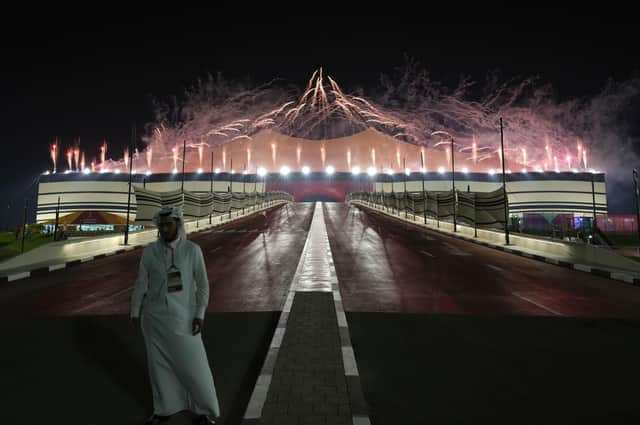Owen Polley: It’s almost impossible to keep politics out of a world cup


The Northern Ireland team is not involved this year, but some fans feel understandably that it is not a bad tournament to miss, given that it has already generated so many controversies.
The decision to stage the competition in a tiny, Middle Eastern country was, to put it mildly, an eccentric move by the game’s governing body, FIFA. The organisation’s former president, Sepp Blatter, acknowledged last week that “it was a bad choice” and that “football and the world cup are too big” for such a small nation to host.
Advertisement
Hide AdAdvertisement
Hide AdQatar is smaller than Northern Ireland, and while it is home to 2.3 million expats, there are only just over 300,000 Qatari citizens. Many commentators allege that the country’s wealth affected FIFA’s decision-making and there were even accusations of outright corruption in the bidding process.
Qatar’s attitude to human rights is another source of controversy and some protesters appealed to companies and players to boycott the world cup over these issues.
Its monarchical system of government looks undemocratic and authoritarian to western eyes, while its approach to matters like homosexuality and alcohol is shaped by a strict interpretation of Islam rather than liberal values.
It is alleged that many of the migrant workers employed to build world cup stadiums in Qatar were little more than slave labourers.
Advertisement
Hide AdAdvertisement
Hide AdThe Guardian reported that thousands of Asian employees in the country died from ‘unexplained causes’, in the decade running up to the tournament.
That’s before we get into the many practical objections that European fans, in particular, have to a world cup taking place in Qatar.
The difficulties and expense of getting there are at the head of that list. Then there is the relative lack of accommodation and infrastructure.
The fact that the tournament is taking place in the winter, rather than the summer, because of high temperatures in the Middle East. The interruption that that entails for European club football. The country’s strict rules on alcohol and its authoritarian attitudes to public order.
And on and on.
Advertisement
Hide AdAdvertisement
Hide AdIn a recent article in the online magazine UnHerd, the football historian, Jonathan Wilson, pointed out that world cups have frequently created political controversy and unpleasant regimes have used the tournaments to court popularity among their own people or gain legitimacy on an international stage.
So much has happened since 2018 that the competition in Russia could almost have taken place in an age of innocence. At the time, though, there were already plenty of criticisms of that country’s regime ahead of the finals, including its entanglements abroad, its antipathy to modern western attitudes, and its use of migrant labour.
There were objections too based on the perceived threat of hooliganism in Russia and doubts about the fairness of the bidding process.
It might seem like these problems are new and that they are caused by a recent influx of money and commercialism to football. Wilson, though, traced the world cup’s dark history much further back. He highlighted how Mussolini used the 1934 finals in Italy to promote his fascist beliefs at home and abroad. He pointed out that the 1978 tournament in Argentina bolstered a brutal military dictatorship there.
Advertisement
Hide AdAdvertisement
Hide AdWe often hear the cliché that politics should be kept out of sport. Unfortunately, that is almost impossible, particularly where international competition is concerned.
The fortune of national teams, particularly in the world’s most popular game, will always have an impact on a country’s morale, its people’s sense of identity and its prestige in the eyes of others.
The world cup, and other major sporting events, have been used by authoritarian regimes to hide their crimes, or to promote political ideologies. But, equally, the tournaments have been woven into the national stories of democratic countries.
The England team’s triumph in 1966 was depicted as an extension of growing British confidence and cultural influence during the swinging sixties, for example.
Advertisement
Hide AdAdvertisement
Hide AdThe post-war success of West Germany and, subsequently the united German team, was seen as a symbol of that country’s emergence as a modern industrial powerhouse.
The world cup in South Africa was cast as a staging post for a newly formed ‘rainbow nation’ that was leaving behind its racist past. Indeed, that tournament was portrayed as the start of an era of recognition for the African continent, which took its place at the heart of international affairs after centuries of apparent abuse and neglect.
Now that the competition in Qatar is underway, most of us will set aside our qualms and get caught up in the action on our TV sets. Inevitably, World Cup 2022 will be used to tell a new set of stories about the hosts and the other nations taking part.
Many people in Northern Ireland will follow the fortunes of the English and Welsh teams particularly closely, whether we are cheering them on or shouting for their opponents. England and Wales’ success, or lack of it, will be used to make political points too; about identities in the UK, race, diversity, Brexit or whatever other preoccupations commentators project on to those sportsmen.
Advertisement
Hide AdAdvertisement
Hide AdWhether the world cup in Qatar is a success or not, it will be a fascinating spectacle discussed and debated by millions. And it will continue to show that politics and sport are almost impossible to separate.
See also